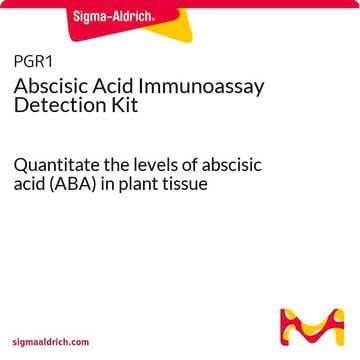This product is synthetic. This isomer is isolated from the racemic mixture.
A4906
(+)-Abscisic acid
≥98% (HPLC), powder, growth regulator
Synonym(s):
(S)-5-(1-Hydroxy-2,6,6-trimethyl-4-oxo-2-cyclohexen-1-yl)-3-methyl-(2Z,4E)-pentadienoic acid, ABA, Dormin
Select a Size
About This Item
Recommended Products
Product Name
(+)-Abscisic acid, ≥98% (HPLC)
Quality Level
Assay
≥98% (HPLC)
form
powder
application(s)
agriculture
storage temp.
−20°C
SMILES string
CC(\C=C\[C@@]1(O)C(C)=CC(=O)CC1(C)C)=C\C(O)=O
InChI
1S/C15H20O4/c1-10(7-13(17)18)5-6-15(19)11(2)8-12(16)9-14(15,3)4/h5-8,19H,9H2,1-4H3,(H,17,18)/b6-5+,10-7-/t15-/m1/s1
InChI key
JLIDBLDQVAYHNE-YKALOCIXSA-N
Looking for similar products? Visit Product Comparison Guide
Application
- as a supplement for the germination of Arabidopsis thaliana seeds [1]
- as a component of buffered nodulation medium to check its effects on lateral root density (LRD) in leguminous and non-leguminous plants [2]
- as a standard to study its effects on root meristem defects in Medicago truncatula latd mutant [3]
Biochem/physiol Actions
Other Notes
Signal Word
Warning
Hazard Statements
Precautionary Statements
Hazard Classifications
Aquatic Acute 1 - Aquatic Chronic 1
Storage Class Code
11 - Combustible Solids
WGK
WGK 3
Flash Point(F)
Not applicable
Flash Point(C)
Not applicable
Personal Protective Equipment
Choose from one of the most recent versions:
Certificates of Analysis (COA)
Don't see the Right Version?
If you require a particular version, you can look up a specific certificate by the Lot or Batch number.
Already Own This Product?
Find documentation for the products that you have recently purchased in the Document Library.
Customers Also Viewed
-
How is Product A4906, (+)-Abscisic acid, prepared?
1 answer-
Helpful?
-
-
How should Product A4906, (+)-Abscisic acid solutions be stored?
1 answer-
A solution of (+)-Abscisic acid should be stored in single use aliquots at -20°C.
Helpful?
-
-
What solvents can be used with Product A4906, (+)-Abscisic acid?
1 answer-
Abscisic acid, Product No. A4906, is soluble in ethanol (10 mg/mL), yielding a clear, colorless solution. For plant cell culture, it can be solubilized in a small amount of 1 N NaOH and diluted with water or medium.
Helpful?
-
-
What is the Department of Transportation shipping information for this product?
1 answer-
Transportation information can be found in Section 14 of the product's (M)SDS.To access the shipping information for this material, use the link on the product detail page for the product.
Helpful?
-
-
What concentration of Product A4906, (+)-Abscisic acid, is used in plant cell culture?
1 answer-
(+)-Abscisic acid is used at 0.1 to 10 mg/L for plant cell culture.
Helpful?
-
-
How does the storage temperature relate to shipping conditions?
1 answer-
The storage conditions that a Sigma-Aldrich catalog and label recommend for products are deliberately conservative. For many products, long-term storage at low temperatures will increase the time during which they are expected to remain in specification and therefore are labeled accordingly. Where short-term storage, shipping time frame, or exposure to conditions other than those recommended for long-term storage will not affect product quality, Sigma-Aldrich will ship at ambient temperature. The products sensitive to short-term exposure to conditions other than their recommended long-term storage are shipped on wet or dry ice. Ambient temperature shipping helps to control shipping costs for our customers. At any time, our customers can request wet- or dry-ice shipment, but the special handling is at customer expense if our product history indicates that the product is stable for regular shipment.
Helpful?
-
Active Filters
Our team of scientists has experience in all areas of research including Life Science, Material Science, Chemical Synthesis, Chromatography, Analytical and many others.
Contact Technical Service










